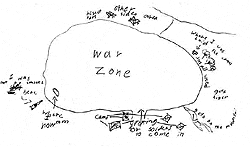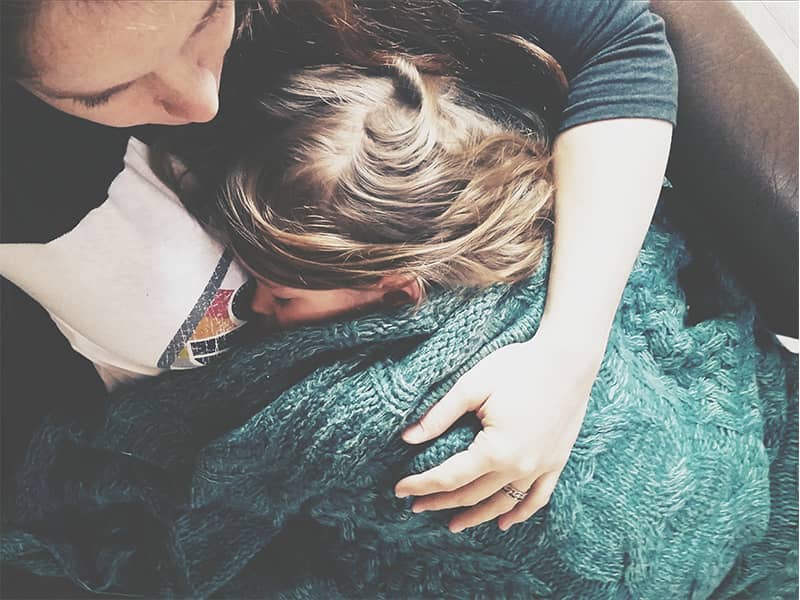 "Sit on your mom's lap, close your eyes, and tell me what you see when you hear the loud noises that scare you," Norman gently instructed Chase. I looked down at Chase's freckled face. Nothing could have prepared me for what I was about to hear.
"Sit on your mom's lap, close your eyes, and tell me what you see when you hear the loud noises that scare you," Norman gently instructed Chase. I looked down at Chase's freckled face. Nothing could have prepared me for what I was about to hear.
Young Chase immediately began describing himself as a soldier--an adult soldier--carrying a gun. "I'm standing behind a rock. I'm carrying a long gun with a kind of sword at the end." My heart was pounding in my ears, and the hair on my arms stood up as I listened. His 9-year-old sister Sarah and I glanced at each other in wide-eyed amazement.
"What are you wearing?" Norman questioned.
"I have dirty, ripped clothes, brown boots, a belt. I'm hiding behind a rock, crouching on my knees and shooting at the enemy. I'm at the edge of a valley. The battle is going on all around me."
I listened to Chase, surprised to hear him talk about war. He had never been interested in war toys and had never even owned a toy gun. He always preferred games and construction toys; he would spend hours at a time happily building with blocks, Legos, and his wooden trains. His television watching was strictly limited to Sesame Street and Mister Rogers, and none of the Disney movies he had seen depicted war.
"I'm behind a rock," he said again. "I don't want to look, but I have to when I shoot. Smoke and flashes everywhere. And loud noises: yelling, screaming, loud booms. I'm not sure who I'm shooting at--there's so much smoke, so much going on. I'm scared. I shoot at anything that moves. I really don't want to be here and shoot other people."

Chase drew this battlefield scene after his second regression, when he was eight years old.
Although this was Chase's little-boy voice, his tone was serious and mature--uncharacteristic of my happy five-year-old. He actually seemed to be feeling this soldier's feelings and thinking his thoughts. He really didn't want to be there shooting at other men. This was not a glorified picture of war or soldiering; Chase was describing the sentiments of a man in the heat of battle who had serious doubts about the value of his actions and was terrified, thinking only of staying alive. These feelings and images were coming from someplace deep within him. Chase was not making this up.
Norman sensed Chase's distress with his role as a soldier who, in order to survive, had to kill other men. He explained to Chase, talking slowly, "We live many different lives on Earth. We take turns playing different parts, like actors in a play. We learn what it means to be human by playing these different parts. Sometimes we are soldiers and kill others in a battle, and sometimes we are killed. We are simply playing our parts to learn." Using simple language, Norman emphasized that there was no blame in being a soldier. He assured Chase that he was just doing his job, even if he had to kill other soldiers in battle. As my son listened to Norman's assurances, I could feel his body relax and his breathing become more regular. The anguished look on his face melted away. Norman's words were helping. Young Chase was actually understanding and responding to these universal concepts.
When Norman saw that Chase had calmed down, he asked him to continue telling us what he saw.
"I'm crouching on my knees behind the rock. I'm hit in the right wrist by a bullet someone shot from above the valley. I slide down behind the rock, holding my wrist where I was shot. It's bleeding--I feel dizzy.
"Someone I know drags me out of the battle and takes me to a place where they took soldiers that are hurt--not like a regular hospital, just big poles, like an open tent, covered with material. There are beds there, but they're like wooden benches. They're very hard and uncomfortable."

Chase's picture of a horse pulling a mortar, drawn after his second regression.
Chase said that he felt dizzy and could hear the sounds of gunfire around him as his wrist was being bandaged. He said he was relieved to be out of the fighting. But it wasn't long before he was ordered back into battle, and he reluctantly returned to the shooting.
"I'm walking back to battle. There are chickens on the road. I see a wagon pulling a cannon on it. The cannon is tied onto the wagon with ropes. The wagon has big wheels."
As Chase pattered out of the kitchen, Norman, Sarah, and I looked at each other with our mouths open. I glanced at the clock on the stove: only twenty minutes had passed since Norman had told Chase to close his eyes. It felt like hours. Norman broke our stunned silence to ask for another cup of tea. We talked about the small miracle we had just witnessed. Norman was sure that Chase had remembered a past life. He explained that a traumatic experience in a past life such as being in war--and especially a traumatic death-can cause a phobia in the present life. Could this past life war experience be the cause of Chase's extreme fear of loud noises? Possibly. Norman said we'd have to wait and see if the fear went away.
Norman admitted that he had never worked with a child so young and that he was surprised at how easily Chase had retrieved his past life memory--no hypnotic induction had been needed, as with his older clients. Apparently, Chase's memories were close to the surface and needed only gentle encouragement to come out.
Sarah, who had been quietly absorbing everything that happened, suddenly bounced up and down in her chair, waving her arms, and piped in, "That spot on Chase's wrist, where he was shot-that's where his eczema is!"
She was right. The location of the wound Chase described was exactly the same location as that of a persistent rash he had suffered since he was a baby. He had always had severe eczema on his right wrist. Whenever he became upset or tired, he scratched that wrist until it bled.
Sarah said that it sounded like Chase was "ripping his flesh" as he relentlessly scratched that one spot. I often bandaged his wrist to prevent his scratching and bleeding. Without a bandage, Chase would wake up with blood streaked on his sheets. I had taken him to several doctors because of the severity of his rash, but allergy testing, a food elimination diet, salves, and ointments failed to clear it up.To our astonishment and relief, within a few days of his regression to the lifetime as a soldier, the eczema on Chase's right wrist vanished completely, and it has never returned.
Chase's fear of loud noises also totally disappeared. Fireworks, explosions, and booming sounds never scared him again. In fact, soon after the regression Chase began showing an intense interest in playing the drums. For his sixth birthday he got his first drum set. Now he's a serious drummer, filling the house with loud booming sounds every day.

